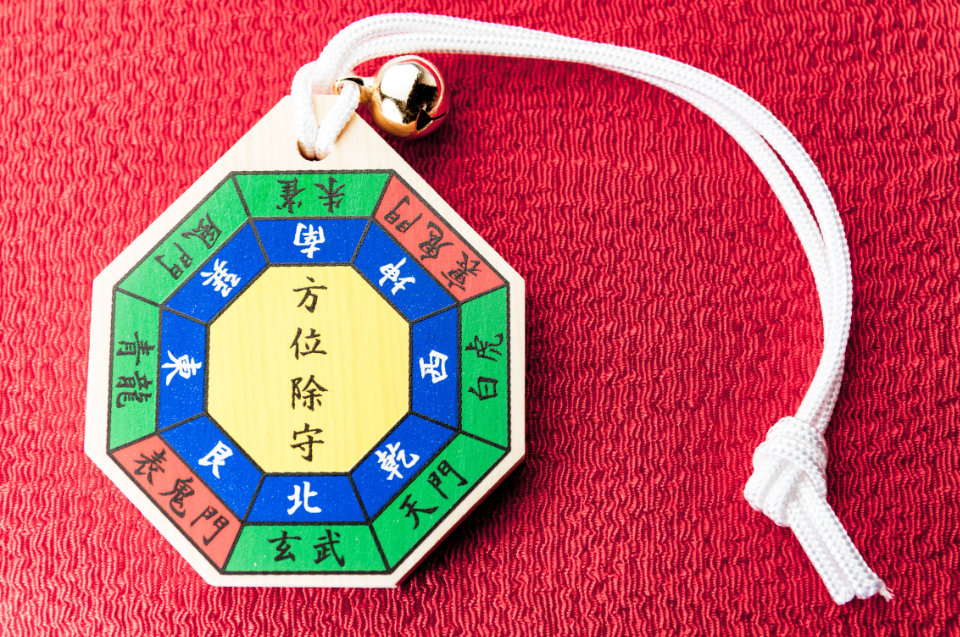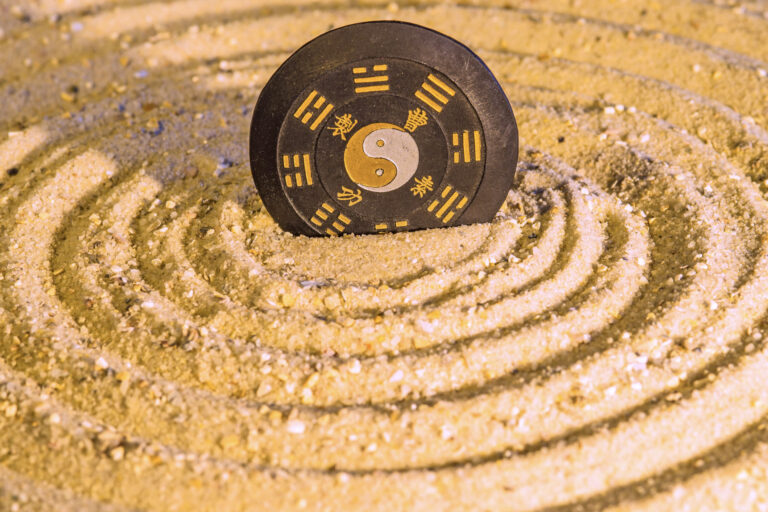Feng Shui, an ancient Chinese practice that has spanned over 3,000 years, is more than just a philosophical or esoteric concept.
Its principles, deeply rooted in Taoist ideology, permeate numerous facets of life, influencing everything from city planning and architectural designs to the arrangement of furniture within our homes.
This article serves as a guide to the practical applications of Feng Shui, demonstrating how you can employ its tenets in real-life scenarios, and detailing its profound effects on your daily experiences.
Table of Contents
Understanding Basic Feng Shui Principles
The foundations of Feng Shui are best understood through the principles of Bagua, the Five Elements, Yin and Yang, and the Luo Pan. The Bagua, an eight-sided grid incorporating symbols and trigrams, represents various life aspects such as wealth, career, and relationships.
Each segment of your living or work area aligns with a different aspect of this grid, and the manner in which you organise, decorate, and utilise these spaces can directly influence their corresponding life sectors.
The Five Elements – Wood, Fire, Earth, Metal, and Water – describe the interactions and relationships between various phenomena. Their influence on the energy, or ‘Qi’, within a space can govern various facets of life, including health, wealth, and relationships.
The interplay of Yin and Yang, representing balance and contrast between opposing yet interconnected forces, forms another central tenet of Feng Shui. Creating harmony between the passive, soft, and dark energy of Yin and the active, hard, and bright energy of Yang in a space promotes a beneficial balance, influencing well-being and prosperity.
An essential tool used by Feng Shui Masters is the Luo Pan, or Feng Shui compass. This complex instrument incorporates the Bagua, the Five Elements, Yin and Yang, and other essential Feng Shui principles into a comprehensive guide for energy reading.
The Luo Pan aids in accurate measurement and analysis of the directional influence on a space, allowing for precise adjustments to achieve optimal Qi flow.
By interpreting the readings from the Luo Pan, Feng Shui Masters can create detailed and powerful practical applications of Feng Shui solutions.

Practical Applications of Feng Shui in Home Design
Applying Feng Shui principles can transform any space, but they carry particular significance in our homes, where we spend most of our time.
Your living room, a vital hub for family interactions and leisure, should be designed to encourage a positive energy flow. It should be spacious, well-lit, and devoid of clutter. Implementing the right colours and shapes, along with strategically placed furniture, can effectively optimise the Feng Shui of this space.
For instance, a simple adjustment like placing your sofa against a solid wall (representing support) can significantly influence the room’s energy flow.
In contrast, bedrooms should channel more Yin energy to promote peace and tranquillity. Achieving this requires softer lighting and colours, a minimum of electronic devices, and positioning the bed in a command position – away from direct alignment with the door, yet maintaining a clear view of the room and entrance.
Making sure your bedroom door does not face a mirror can help prevent energy drain, highlighting another crucial aspect of the practical applications of Feng Shui in bedrooms.
Feng Shui in the Workplace
Feng Shui can work wonders in a workplace, promoting harmony, reducing stress, and enhancing productivity.
Arranging desks in a commanding position, from where one can view the entrance without being in direct line with the door, can facilitate an effective working environment. It’s essential to keep the area clutter-free, with organised files and papers, to promote a flow of ideas and prevent blockages.
Colour therapy can also impact the energy within a workspace. For example, blue stimulates the mind, yellow fosters creativity, red invigorates energy levels, and green creates a sense of balance. It’s best to choose colours based on the nature of the work being performed in that space.
Adding live plants can enhance air quality and introduce the wood element, symbolising growth and creativity.
Feng Shui for Health and Wellness
Feng Shui also extends to personal health and wellness. The centre of the home or Bagua, considered the health area, should remain clean, clutter-free, and well-lit to promote good health.
Including plants, particularly those with round leaves, can enhance health as they symbolise the wood element, associated with growth and vitality.
Colours also have a direct influence on health; blue and black support the water element and can be calming, promoting mental health, while green, supporting the wood element, can promote healing.
Real-Life Examples and Practical Applications of Feng Shui
- Feng Shui for Academic Success: Parents often seek ways to boost their children’s academic performance. Feng Shui suggests keeping study spaces clean and clutter-free to promote focus. The desk should face the room’s door, with a solid wall behind for support. Avoid placing the desk in front of a window, as this can distract the child. A good balance of natural light and artificial light helps in maintaining a positive energy flow. Colors can also play a part. For instance, light colors stimulate the mind, while darker shades can lead to more focused thinking.
- Navigating Life Transitions: During significant life changes like marriage or a new job, Feng Shui can help navigate these transitions. For example, in the most luckiest zodiac sign in 2024, Feng Shui principles might suggest incorporating certain colors, elements, or symbols into your home to invite positivity and ward off negativity.
- Coping with the Hungry Ghost Festival: Feng Shui provides valuable guidance for rituals and practices to avoid attracting bad luck during the Hungry Ghost Festival, such as not hanging clothes outside at night or avoiding water activities.
- Leveraging the Tiger God Birthday: According to Feng Shui, paying homage to the Tiger God on his birthday can attract protection and good fortune.
- Using Money Attraction Symbols: Feng Shui recommends placing certain money attraction symbols in specific sectors of the home or office to improve wealth and prosperity. For instance, a three-legged toad or a laughing Buddha near the entrance can attract wealth. The most powerful money attraction symbols can further amplify these effects.
- Navigating Karmic Debt Calculator Results: A high karmic debt number might suggest potential challenges. Feng Shui can provide strategies to mitigate these issues, like using certain colors or elements, or organizing your space in a specific manner.
The Harmony of the Universe in Our Hands
Feng Shui is more than just an ancient practice; it is the key to bringing the harmony of the universe into our everyday lives. By understanding the influences of energy and elements around us, we can learn to shape our lives for the better.
From promoting academic success to navigating life transitions and attracting wealth, practical applications of Feng Shui offer invaluable tools for anyone willing to learn.
The examples above illustrate just a handful of ways that Feng Shui can be leveraged. When applied correctly, Feng Shui can bring about a profound shift in our life experiences, bringing us closer to the harmony and prosperity we seek.
This comprehensive article offers an exploration into the practical application of Feng Shui in real-life contexts.
As we continue to embrace ancient wisdom in our modern world, we not only honor our past but also enrich our future.
Whether you’re new to Feng Shui or have been practicing for years, may the journey towards better understanding bring balance, success, and joy to your life.
What are some real-life examples of Feng Shui enhancing business success?
Many businesses utilize Feng Shui to boost their success. For instance, arranging workstations to face certain directions can boost productivity, placing a water feature at the entrance can attract wealth, and using specific colors can stimulate different energies.
Can Feng Shui be applied in public spaces?
Yes, Feng Shui can be used in public spaces such as parks, squares, or city layouts. In Hong Kong, for example, the feng shui principles guided the construction of the HSBC building.
Does Feng Shuireally affect my health?
Feng Shui advocates believe that the environment greatly impacts an individual’s health. Clearing clutter, ensuring good air and light quality, and arranging furniture for smooth energy flow are practical applications of Feng Shui that could positively affect your well-being.
How can I use Feng Shui to improve my relationships?
Feng Shui can be used to foster better relationships by promoting positive energy. For instance, using pairs of objects in your decor can symbolize partnership, while positioning your bed to have a clear vantage point of the room can create a sense of security and control.
Is there scientific evidence supporting Feng Shui’s effectiveness?
While Feng Shui is not a scientifically validated system, some of its principles align with modern environmental psychology and design theories. Many people report positive changes after applying Feng Shui, suggesting a potential placebo effect.



